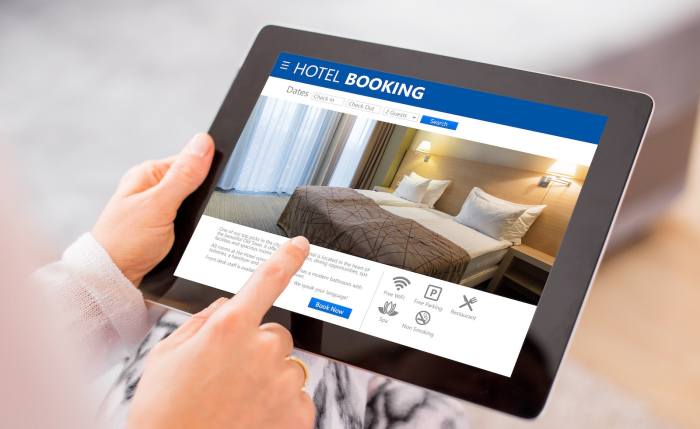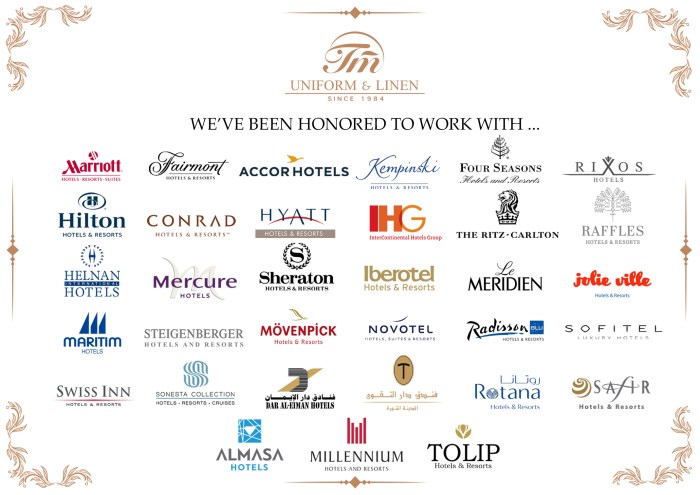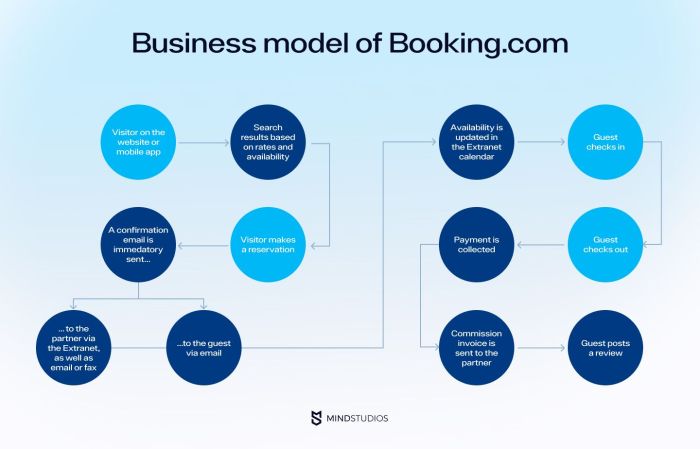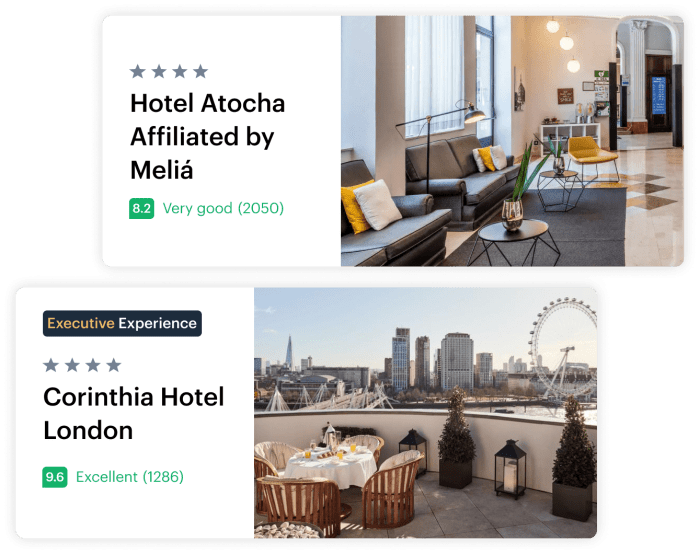Corporate Hotel Booking A Practical Guide

Corporate hotel booking is more than just finding a room; it’s about optimizing travel budgets, ensuring employee satisfaction, and adhering to company policies. This guide dives into the world of corporate travel, exploring everything from choosing the right booking platform to understanding the latest industry trends. We’ll cover strategies for cost-effective bookings, the role of technology in streamlining the process, and the challenges businesses face in managing their hotel reservations.
We’ll examine the key players in the corporate hotel booking market, comparing different platforms and their features. Also explore the crucial elements of corporate travel policies, detailing the steps involved in making a reservation and highlighting the importance of integrating technology for efficiency. Finally, we’ll look at future trends and how businesses can adapt to the ever-changing landscape of corporate travel.
Understanding the Corporate Hotel Booking Market

Source: cmshospitality.com
The corporate hotel booking market is a significant segment of the hospitality industry, characterized by high-volume transactions, negotiated rates, and a focus on efficiency and cost-effectiveness for businesses. Understanding its dynamics is crucial for hotels and booking platforms aiming to capture market share.
Key Characteristics of the Corporate Hotel Booking Market
This market is driven by the needs of businesses of all sizes, from small startups to multinational corporations, requiring accommodations for employees traveling for work. Key characteristics include high demand for consistent service, negotiated rates and contracts, loyalty programs, and a preference for online booking systems that integrate with expense management tools. The market is also influenced by travel policies, corporate budgets, and the overall economic climate. Seasonal fluctuations in demand are also significant, with peaks during trade shows and conferences.
Major Players in the Corporate Hotel Booking Sector
The corporate hotel booking sector involves a complex ecosystem of players. Hotels themselves are key players, directly negotiating rates and contracts with corporations. Online Travel Agencies (OTAs) like Expedia and Booking.com play a significant role, offering corporate booking solutions alongside their consumer-facing platforms. Specialized corporate travel management companies (CTMCs) such as American Express Global Business Travel and BCD Travel manage travel arrangements for large corporations, negotiating favorable rates and providing comprehensive travel management services. Finally, technology providers offer Software-as-a-Service (SaaS) solutions to streamline the booking process for both corporations and hotels.
Comparison of Corporate Hotel Booking Platforms
Different platforms cater to different needs and preferences. Some focus on ease of use and integration with existing corporate systems, while others emphasize cost savings or a wider selection of hotels. The choice often depends on the size and specific needs of the corporation.
Corporate Hotel Pricing Strategies
Hotels employ various pricing strategies to attract corporate clients. Negotiated rates are common, with discounts offered in exchange for guaranteed volume. Contractual agreements often include minimum stays, specific room types, and other terms. Some hotels offer corporate loyalty programs with perks like upgrades and priority service. Dynamic pricing, adjusting rates based on demand, is also used, though often with pre-negotiated rate floors for corporate clients. The pricing strategy employed depends on factors such as the hotel’s occupancy rate, competitor pricing, and the client’s negotiating power.
Comparison of Three Major Corporate Booking Platforms
| Feature | Platform A (e.g., SAP Concur) | Platform B (e.g., CWT) | Platform C (e.g., Expedia for Business) |
|---|---|---|---|
| Pricing Model | Subscription-based, per-user or per-transaction fees | Negotiated rates with hotels, potentially including fees | Commission-based on bookings |
| Features | Extensive reporting and analytics, integration with expense management systems, robust policy management | Global hotel network, travel policy enforcement, 24/7 support | Wide hotel selection, user-friendly interface, online booking tools |
| Target Audience | Large enterprises with complex travel needs | Corporations of all sizes, emphasis on global reach | For small to medium-sized businesses, ease of use is prioritized |
Corporate Travel Policies and Booking Procedures

Source: tmuniform.com
Navigating the world of corporate travel can feel like navigating a maze, especially when it comes to hotels. Understanding your company’s travel policy and booking procedures is key to smooth, efficient, and compliant trips. This section will break down the essentials, helping you understand the process and avoid potential headaches.
Typical Elements of a Corporate Travel Policy Regarding Hotel Bookings
Corporate travel policies regarding hotels usually cover several key areas. These policies aim to control costs, ensure employee safety, and maintain consistency across the organization. Common elements include preferred hotel chains or programs (often offering discounted rates), acceptable spending limits per night, required booking channels (e.g., a specific online booking tool or a designated travel management company), and guidelines on acceptable room types. Policies may also address issues like cancellation policies, expense reporting procedures, and requirements for receipts. The specific details vary widely depending on the company’s size, industry, and overall travel budget. For example, a large multinational corporation might have a very detailed policy with numerous stipulations, while a smaller company may have a simpler, less prescriptive approach.
Booking a Hotel Through a Corporate Travel Management Company (TMC)
Many large corporations utilize a TMC to manage their employees’ travel arrangements. TMCs offer centralized booking systems, negotiate bulk discounts with hotels, and provide 24/7 support for travelers. The booking process typically involves the employee submitting a travel request through the company’s internal system, which might be integrated with the TMC’s platform. The TMC then verifies the request, checks for policy compliance, and books the hotel reservation. The employee receives confirmation details, and the TMC handles any necessary changes or cancellations. Using a TMC often streamlines the process, simplifies expense reporting, and provides access to better rates and services. For instance, a TMC might offer preferred rates with a specific hotel chain, reducing costs for the company and simplifying the booking process for the employee.
The Role of Technology in Streamlining Corporate Hotel Booking Procedures
Technology plays a crucial role in modern corporate hotel booking. Online booking tools, integrated with company travel policies and expense management systems, automate many aspects of the process. These tools often include features such as real-time availability checks, price comparisons, and automated expense reporting. Mobile apps allow employees to book and manage their travel arrangements from anywhere, anytime. Furthermore, data analytics within these systems can help companies identify cost-saving opportunities and improve travel policy effectiveness. For example, a company might use data to determine which hotels offer the best value or to identify patterns in employee travel preferences, leading to more efficient and cost-effective travel management.
Examples of Different Booking Workflows for Corporate Travelers
Booking workflows vary depending on the company’s size, structure, and the tools they use. A smaller company might use a simple online booking tool with direct access to hotel websites, while a larger corporation might use a more complex system involving a TMC and multiple layers of approval. In some cases, employees may have to submit a travel request for approval before booking a hotel. Other companies might allow employees to book directly, provided they stay within the company’s travel policy guidelines. A common scenario is where employees use a company-approved online booking tool that integrates with their expense reporting system, streamlining the entire process from booking to reimbursement.
Step-by-Step Guide for a Corporate Employee Booking a Hotel Using a Company-Approved Platform
Before booking, always review your company’s travel policy to understand spending limits and preferred suppliers.
- Log in to your company’s approved travel booking platform (this might be a TMC portal or a company-specific system).
- Enter your travel dates and destination.
- Specify your preferred hotel criteria (e.g., star rating, amenities).
- Review available hotels, considering pricing and policy compliance.
- Select your preferred hotel and room type.
- Review your booking details and confirm your reservation.
- Save your confirmation details and ensure you receive any necessary travel documents.
Factors Influencing Corporate Hotel Choices: Corporate Hotel Booking
Selecting the right hotel for corporate travelers involves a complex interplay of factors, going beyond simply finding a bed for the night. Companies consider various elements to ensure employee comfort, safety, and cost-effectiveness, while also reflecting their brand image and sustainability goals. This section will delve into the key decision-making factors for corporate hotel bookings.
Location and Accessibility
The hotel’s location is paramount. Proximity to the business meeting location, airport, and public transportation is crucial for minimizing travel time and maximizing productivity. Easy access to key business districts, convenient parking, and well-connected transport links are all highly valued. Companies often prioritize hotels that reduce travel time and associated expenses for their employees. A hotel located in a safe and well-lit area also contributes to employee well-being and security.
Amenities and Services
Beyond basic accommodation, corporate travelers require specific amenities. High-speed, reliable internet access is essential for conducting business, while meeting rooms with advanced technology (projectors, video conferencing capabilities) are frequently required. Business centers with printing and administrative support are also highly desirable. Fitness centers, swimming pools, and on-site dining options enhance employee comfort and well-being, though the importance of these amenities can vary depending on the length of stay and the type of corporate traveler.
Pricing and Value
Cost is a significant factor, and companies typically negotiate corporate rates to secure competitive pricing. The overall value proposition – the balance between price and the quality of amenities and services – is carefully evaluated. Negotiated rates, bundled packages, and discounts for extended stays can significantly influence the final decision. Cost-saving measures often involve prioritizing hotels offering complimentary services like breakfast or airport transfers.
Loyalty Programs and Corporate Rates
Corporate loyalty programs are invaluable for companies with frequent travelers. These programs offer perks like discounted rates, room upgrades, priority check-in, and bonus points that can be redeemed for future stays. Companies leverage these programs to maximize savings and provide their employees with enhanced travel experiences. The ability to consolidate expenses and track spending through a single platform is another significant advantage of corporate loyalty programs.
Sustainability Initiatives
Increasingly, corporations prioritize environmentally responsible practices. Hotels demonstrating commitment to sustainability, such as through energy-efficient operations, waste reduction programs, and the use of locally sourced products, are favored. Companies often incorporate sustainability criteria into their hotel selection process, aligning their travel choices with their broader environmental, social, and governance (ESG) objectives. Certifications like LEED (Leadership in Energy and Environmental Design) can significantly enhance a hotel’s appeal to environmentally conscious corporations.
Traveler Preferences and Amenities
Different types of corporate travelers have varying preferences. For example, executives might prioritize luxury amenities and personalized service, while sales representatives might favor convenient locations and reliable internet access. Similarly, longer-term stays might necessitate amenities like kitchenettes or laundry facilities. Understanding these nuances allows companies to tailor their hotel choices to meet the specific needs of their employees, improving overall satisfaction and productivity.
Marketing Materials for Corporate Clients
Hotels employ various marketing strategies to attract corporate clients. Effective marketing materials highlight the features most valued by corporate travelers.
Example 1: A brochure showcasing a hotel’s state-of-the-art meeting rooms, high-speed internet, and proximity to major business districts, along with images depicting comfortable workspaces and modern amenities. The brochure would also feature testimonials from satisfied corporate clients and information about corporate rate packages.
Example 2: An email campaign targeted at corporate travel managers, highlighting the hotel’s loyalty program benefits, sustainable practices, and negotiated corporate rates. The email would include a link to a dedicated corporate booking portal, simplifying the booking process.
Example 3: A website landing page dedicated to corporate clients, providing detailed information about meeting room capacities, catering options, and technology available, along with downloadable corporate rate sheets and booking forms. The page would also feature virtual tours of the hotel’s meeting spaces and guest rooms.
Technology and Corporate Hotel Bookings
Technology has revolutionized the corporate hotel booking landscape, offering efficiency, cost savings, and enhanced travel management. From online platforms to mobile apps and data analytics, technological advancements are reshaping how businesses manage their employees’ travel arrangements. This section explores the key technological aspects influencing corporate hotel bookings.
Online Booking Platforms for Corporate Hotel Reservations
Online booking platforms play a crucial role in streamlining the corporate hotel booking process. These platforms offer centralized access to a wide range of hotels, allowing travel managers to compare prices, amenities, and availability across different properties. Features such as negotiated rates, bulk booking capabilities, and reporting tools contribute to greater efficiency and cost control. Popular examples include platforms like Expedia for Business, CWT, and BCD Travel, which often integrate with corporate travel management systems (CTMS). These platforms offer features like automated expense reporting, policy compliance tools, and detailed travel data for analysis.
Benefits of Using Hotel Booking APIs for Corporations
Hotel booking APIs (Application Programming Interfaces) offer corporations even greater control and automation over their hotel booking processes. APIs allow seamless integration of hotel booking functionalities directly into a company’s internal systems, such as their intranet or travel booking portal. This eliminates the need for employees to access external websites, reducing the risk of non-compliance with travel policies and improving data accuracy. The benefits include automated booking confirmations, real-time availability updates, and streamlined expense reporting. Furthermore, APIs enable customized booking experiences tailored to a company’s specific needs and travel policies.
Impact of Mobile Technology on Corporate Travel Booking Behavior
The rise of smartphones and mobile apps has significantly impacted corporate travel booking behavior. Employees now expect to book hotels on the go, using mobile-friendly interfaces that offer the same functionality as desktop platforms. Mobile booking apps offer convenience, allowing employees to quickly search for hotels, compare prices, and make reservations anytime, anywhere. Features like location-based searches, real-time availability updates, and mobile check-in/check-out further enhance the user experience. This shift towards mobile booking has led to increased adoption of mobile-first booking strategies by corporations.
Corporate Hotel Booking App User Interface Mockup
Imagine a corporate hotel booking app with a clean and intuitive interface. The home screen displays a search bar prominently, allowing users to input their destination, dates, and number of guests. Below the search bar, are suggested destinations based on recent searches or frequently booked locations. Once a search is performed, results are displayed as a list of hotels, showing photos, star ratings, prices, and key amenities (e.g., Wi-Fi, parking). Each hotel listing includes a brief description and user reviews. A filter option allows users to refine search results based on criteria such as price range, star rating, amenities, and proximity to specific locations. The booking process is streamlined, requiring minimal input from the user. The app integrates directly with the company’s travel policy, ensuring all bookings comply with internal guidelines. A dedicated section displays upcoming trips, past bookings, and expense reports.
Data Analytics to Improve Corporate Hotel Booking Strategies
Leveraging data analytics can significantly enhance corporate hotel booking strategies. By analyzing booking data, corporations can identify trends and patterns to optimize their travel programs.
- Data Points: Booking frequency, average cost per night, preferred hotel chains, preferred amenities, travel destinations, cancellation rates, and employee satisfaction scores.
- Analysis Methods: Descriptive statistics (mean, median, mode), regression analysis (to identify relationships between variables), time series analysis (to forecast future booking patterns), and sentiment analysis (of employee feedback on hotels).
- Example: Analyzing booking data might reveal that employees frequently book hotels with specific amenities, such as free breakfast or airport shuttles. This information can be used to negotiate better rates with hotels offering these amenities or to adjust the company’s travel policy to encourage bookings at cost-effective hotels that meet employee preferences.
Challenges and Future Trends

Source: themindstudios.com
Navigating the corporate hotel booking landscape presents a unique set of hurdles and opportunities. Understanding these challenges and anticipating future trends is crucial for both corporations and the hotel industry to optimize strategies and remain competitive. This section explores the major obstacles faced, the impact of economic shifts, emerging technological advancements, and predictions for the future of corporate travel.
Major Challenges in Corporate Hotel Booking Management
Corporations face several key challenges in managing their hotel bookings effectively. These range from cost control and policy compliance to data management and the integration of various travel platforms. Poorly managed bookings can lead to increased expenses, wasted time, and frustrated employees.
Economic Factors Affecting Corporate Hotel Spending
Economic fluctuations significantly impact corporate travel budgets and hotel spending. Recessions often lead to reduced travel, resulting in lower demand and potentially lower prices. Conversely, periods of economic growth can increase business travel, driving up demand and hotel rates. For example, during the 2008 financial crisis, corporate travel plummeted, leading to significant discounts in the hotel sector. The subsequent recovery saw a gradual increase in both business travel and hotel prices.
Emerging Trends in Corporate Hotel Booking Technology
The corporate hotel booking landscape is undergoing a rapid transformation driven by technological advancements. The rise of online booking platforms, mobile apps, and sophisticated data analytics tools are changing how corporations manage their travel arrangements. AI-powered tools are increasingly used for tasks like pricing optimization and personalized recommendations. Blockchain technology holds the potential to enhance security and transparency in booking processes. For instance, the increasing use of APIs allows seamless integration of booking systems with corporate travel management platforms.
Predictions for the Future of Corporate Travel and Hotel Bookings
Looking ahead, several trends are likely to shape the future of corporate travel and hotel bookings. Sustainable travel options will gain prominence as corporations prioritize environmental responsibility. The demand for flexible booking options and personalized experiences will increase. The integration of virtual and augmented reality technologies could revolutionize the way corporate travelers experience hotels and plan their trips. We can expect to see a continued rise in the use of data analytics to optimize booking strategies and improve the overall travel experience. For example, we might see a future where AI predicts optimal travel times based on real-time data, leading to cost savings and improved efficiency.
Predicted Growth of Corporate Hotel Booking Market Segments
The following textual representation illustrates a hypothetical growth projection for different segments of the corporate hotel booking market over the next five years. This is a simplified illustration and does not represent actual market data.
| Segment | 2024 | 2025 | 2026 | 2027 | 2028 |
|—————————–|———-|———-|———-|———-|———-|
Business Travel (Domestic) | 10% | 12% | 15% | 18% | 20% |
Business Travel (International) | 8% | 10% | 12% | 15% | 18% |
Leisure Travel (Business Related) | 5% | 7% | 9% | 11% | 13% |
Group Bookings | 6% | 8% | 10% | 12% | 14% |
This table depicts a scenario where domestic business travel shows the strongest growth, followed by international business travel and group bookings. Leisure travel with a business component shows moderate growth. These numbers are purely illustrative and intended to provide a visual representation of potential growth trajectories. Actual growth will depend on various factors, including economic conditions and technological advancements.
Ending Remarks

Source: travelperk.com
Mastering corporate hotel booking requires a strategic approach, balancing cost-effectiveness with employee needs and company policies. By understanding the market dynamics, leveraging technology, and adapting to evolving trends, businesses can optimize their travel programs and ensure a smooth, efficient experience for their employees. This guide provides a solid foundation for navigating the complexities of corporate hotel booking, empowering you to make informed decisions and maximize your travel budget.
Top FAQs
What are the benefits of using a corporate travel management company (TMC)?
TMCs offer negotiated rates, centralized booking systems, 24/7 support, and reporting capabilities, simplifying the booking process and improving cost control.
How can I ensure my hotel booking complies with company policy?
Always book through approved channels (company portal, TMC) and ensure your booking aligns with the company’s travel policy regarding spending limits, preferred hotels, and booking procedures.
What are some common negotiation tactics when dealing with hotels for corporate rates?
Negotiate based on the volume of bookings, length of stay, and specific requirements. Highlight your company’s loyalty and willingness to commit to long-term contracts.
How can I track my corporate hotel booking expenses?
Utilize your company’s expense reporting system and keep all receipts and confirmations. Many booking platforms offer integrated expense reporting features.
What are the implications of choosing a hotel with strong sustainability initiatives?
Choosing sustainable hotels aligns with corporate social responsibility goals, improves the brand image, and can sometimes lead to better rates or incentives offered by eco-conscious hotels.
Comments are closed.